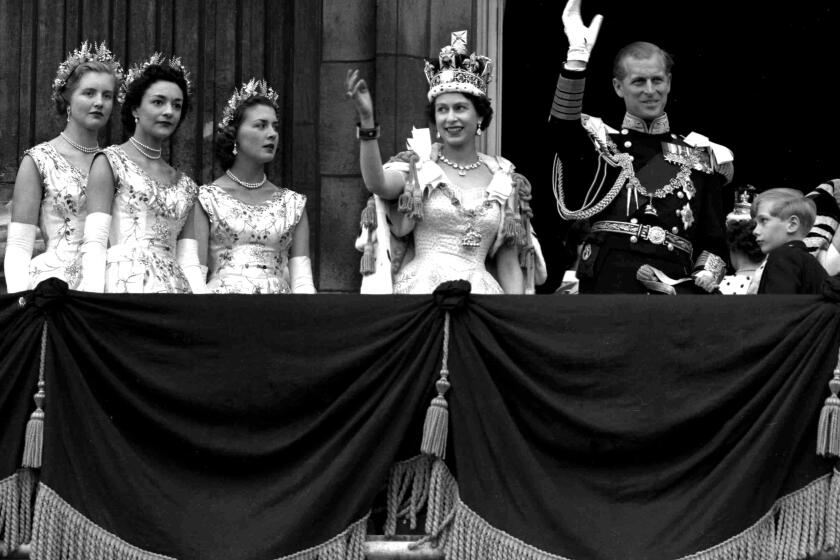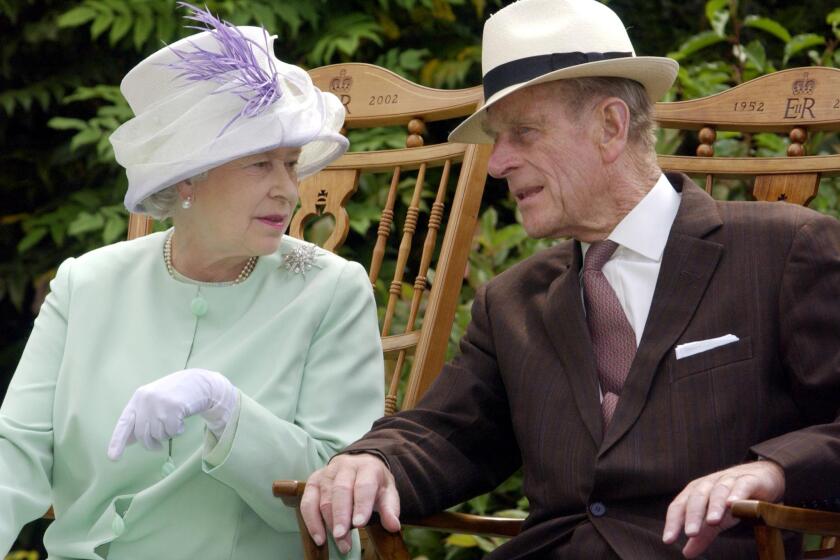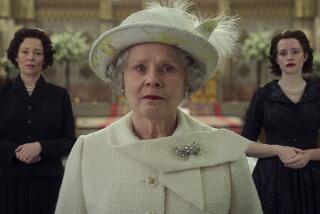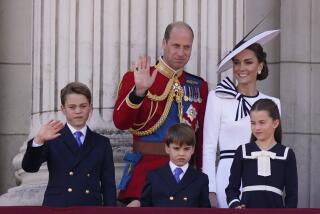Commentary: Should Queen Elizabeth be the last British monarch?
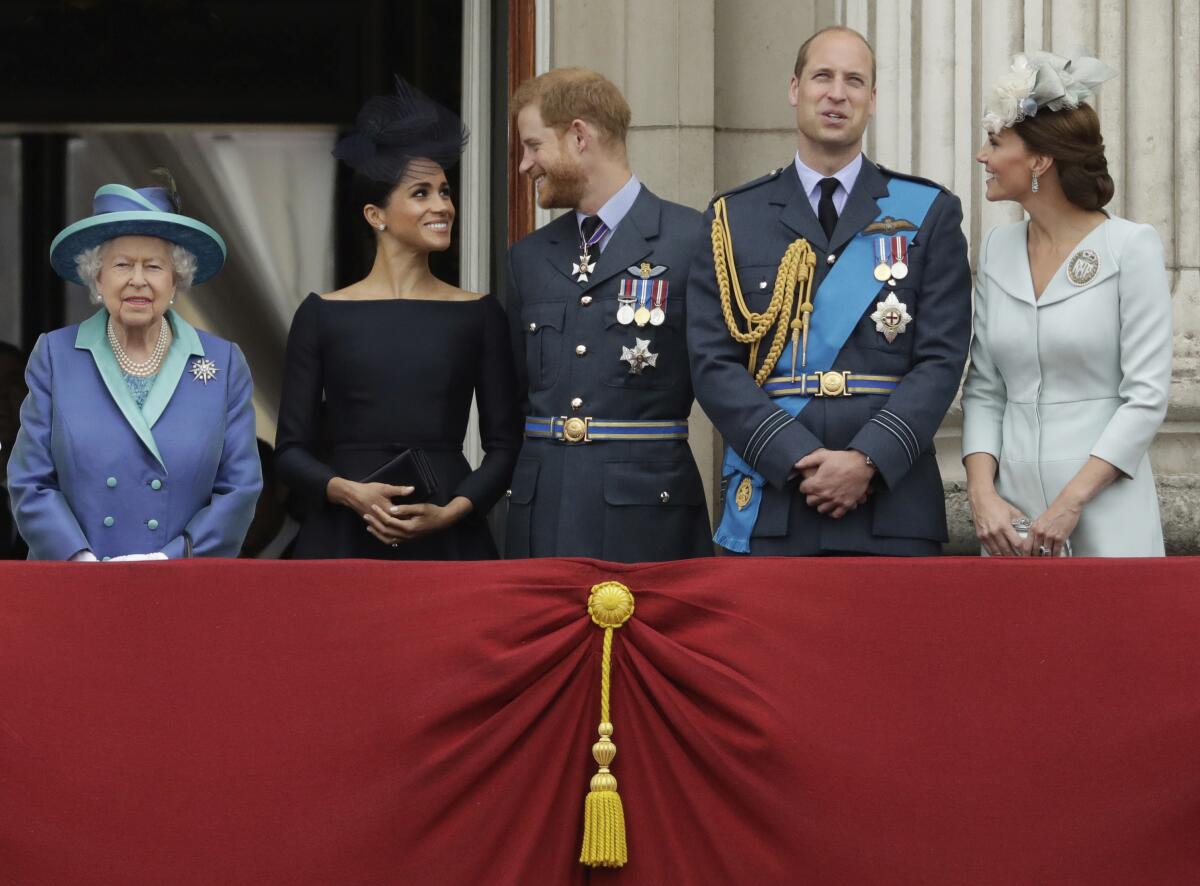
- Share via
Beginning Thursday, Britain will launch a rolling spectacle of events for Queen Elizabeth II’s Platinum Jubilee, a celebration of her 70 years as a reigning monarch — longer than any in British history.
In London, over four public holidays, there will be a parade, a huge concert and the annual military ceremony known as Trooping the Color which features about 1,200 soldiers, 200 horses and 400 army musicians. Meanwhile, communities across the U.K. have planned picnics, singalongs, bell-ringing, and beacon lightings throughout the land. At Stonehenge, images of Elizabeth through the decades are being projected onto the ancient pillars.
Also rising over the landscape are billboards put up by anti-monarchy activists proclaiming starkly, “Make Elizabeth the Last” and “#AbolishtheMonarchy.”
It’s an obvious question: Should Elizabeth be the last monarch? But do we have to answer it when we’re looking forward to watching the royal family alternately smile and squirm, outfitted in hats or military finery, on the Buckingham Palace balcony during the Royal Air Force flyby on Thursday? For royalty fans (obviously I’m one) this is the scene with the full cast of characters in the long-running real-life drama of the British royal family. Or, almost full. Missing from the balcony photo-op will be Prince Andrew, the queen’s second oldest son who was, rightly, banished from royal duties because of his connection to the sex predator Jeffrey Epstein. He settled a lawsuit with a woman who accused him of sexual abuse during the Epstein years.
Britain and its monarchy have changed since Elizabeth’s coronation 70 years ago. But as her jubilee nears, they remain the same in some ways.
After months of speculation, it was announced that the queen’s grandson Prince Harry, his American wife, Meghan Markle, and their two children will travel from their home in Montecito to this event — despite the familial friction. (The couple revealed in a much-viewed Oprah Winfrey interview last year that an unnamed member of the royal family had asked Harry how dark he thought his children with Markle, whose mother is Black, would be.) The duke and duchess of Sussex are reportedly banished from the balcony, where only “working royals” will gather. That seems unfair. Harry may not be a working royal, but he didn’t abdicate. It’s still a family event.
There are concerns over whether Elizabeth herself will be on the balcony Thursday. At 96, visibly frail and walking with a cane, she has been cutting back on appearances. Her hardiness has been her lifelong hallmark. On her 21st birthday, the princess declared in an achingly young voice in a radio broadcast “that my whole life whether it be long or short shall be devoted to your service.”
Since then, she has made good on that promise, showing up at endless ribbon cuttings, officiating at dinners for three-quarters of a century’s worth of heads of state, doing a video skit with Daniel Craig for the opening ceremony of the 2012 Olympics in London, popping up at age 91 in the front row of a London Fashion Week show next to Vogue editor Anna Wintour, and sitting alone, due to COVID-19 protocols, at the funeral of her husband, Prince Philip, last year. Oh, and she had COVID too.
Prince Philip was old school even as the royal family changed around him.
Just as she has been the longest-serving monarch in British history, so her son, Charles, holds the record for longest-waiting heir to the British throne. His mother took the throne at 25. Charles is 73.
Has the monarchy survived this long because Elizabeth has been perceived as honorable and devoted? Is she just unique enough to have kept this aging institution chugging along? Is it just too absurd to have people “reigning” in this day and age?
The royal institution does contribute to an enormously lucrative tourism industry for Britain. The queen gets an annual sovereign grant from the government to fund her official duties, staff and the upkeep and repair of palaces used for events, offices and residences. The payout was equal to about $107 million in the 2020-21 fiscal year. According to the palace, that amounts to about $1.61 per person in the U.K. (The queen also has private income from land and investments that she uses for some of her other family members. She has paid taxes for three decades.) The jubilee itself is spurring increases in sales of food and alcohol as Brits prepare to party and barbecue during the public holidays.
I’ve been fascinated by royalty since Diana, the princess of Wales, showed up on the public stage to enter a doomed marriage with Prince Charles. As a reporter I met her twice and covered two of her trips to the U.S. Since then, I’ve reported on Charles as well. I once flew from Los Angeles to New York to attend the auction of Diana’s dresses at Christie’s in the summer of 1997. Two months later she was dead, and I was sent to England to help cover the aftermath.
Why am I so captivated? It’s part fairy tale, part familiar, with an irresistible heaping of drama thrown in. Clearly, I’m not alone.
Netflix has made four seasons of “The Crown,” the last of which focused heavily on Diana. A fifth is on the way. The movie “Spencer” came out last year and earned Kristen Stewart an Oscar nomination for lead actress. This “Diana-ssance,” as L.A. Times film critic Justin Chang called it in his positive review of the movie, is happening more than two decades after Diana’s death. Winfrey’s interview with Harry and Meghan in March 2021 was watched by more than 17 million people in the U.S. on the night it first aired. The couple are reportedly planning a reality TV series on their lives in Montecito as part of a mega-deal they made with Netflix.
For the moment, let’s not banish the entire royal family from the balcony. Let’s enjoy the show and hope for sightings of Harry and Meghan.
More to Read
A cure for the common opinion
Get thought-provoking perspectives with our weekly newsletter.
You may occasionally receive promotional content from the Los Angeles Times.
